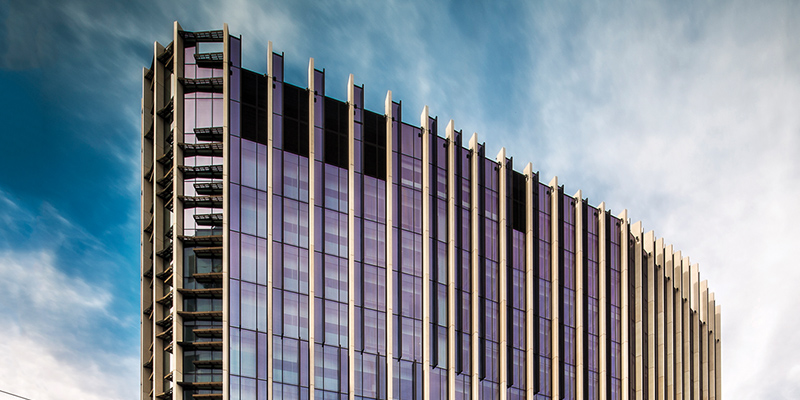UniSA thriving in World Young University rankings
By Michèle Nardelli
 INSIDE UNISA The University of South Australia Cancer Research Institute on North Terrace.
INSIDE UNISA The University of South Australia Cancer Research Institute on North Terrace.At 28 years old and in an increasingly competitive field of young universities, UniSA has maintained its strong position at number 26 in the Times Higher Education global ranking of universities under 50 years old.
The ranking puts UniSA at number three in Australia in the Times Higher Education (THE) Young University Rankings.
The 2019 results also follow a rise of six places in the 2018 worldwide ranking and are in step with the University’s strong performance in the Times Higher Education (THE) Impact Ranking in April this year, where it earned a position of 22 in the world for overall University Impact and top 10 globally for quality education.
Paul Beard, who was Acting Vice Chancellor when the rankings were released, says UniSA continues to strive for improved outcomes in both research and teaching and to build the University’s reputation for enterprise and innovation.
“We are young, so these rankings are particularly important because they reflect our achievements in the company of other young universities and we are performing very well,” Beard says.
“In this year’s Excellence in Research for Australia (ERA) rankings, 100 per cent of our assessed research was rated at or above world standard and in the inaugural Australian Research Council’s impact and engagement assessments, we hit number one in Australia on a combined metric for our impact, approach to impact and engagement with end users.
“It paints an accurate picture of our ambitions for UniSA, which is to become a national and global leader in teaching and research and grow as a future-focused university that doesn’t stop striving for excellence.”
In other accolades, UniSA ranked 21st in the world for Hospitality and Tourism Management in the 2019 Global Ranking of Academic Subjects (GRAS), released in late June by ShanghaiRanking Consultancy. This was a rise of four places compared to the 2018 results.
The ShanghaiRanking also placed UniSA at 30 in the world in the subject area of Mining and Mineral Engineering; and in the top 100 worldwide for Business Administration.
More than 4000 universities were ranked.
The ShanghaiRanking's Global Ranking of Academic Subjects is determined by a series of indicators including: the number of papers authored by an institution in an academic subject; Category Normalised Citation Impact (CNCI); international collaboration on papers; the number of papers published in top journals and conferences in an academic subject; and the number of staff winning significant awards in an academic subject.
The full ranking and methodology can be found on the Academic Ranking of World Universities website.
In the 2020 QS Top 50 Universities Aged Under 50, announced in late June, UniSA was ranked 30th in the world.
Other Stories
- Using free public wifi could be putting you at risk of cyber attack
- Why it’s time to start thinking about batteries for your rooftop solar
- Storytelling technology to revolutionise criminal convictions
- Being environmentally responsible is good for the bottom line
- From the Vice Chancellor
- Achievements and Announcements
- Problematic sexual behaviour among young children raises concerns for teachers
- UniSA thriving in World Young University rankings
- Mobiles can help you better manage your medications
- Hoodie culture a winner for Aboriginal artist
- War veterans tap into their creative side at UniSA
- We asked a UniSA student to review MOD.’s new exhibition
- What it’s like for a student from Peru to study in Adelaide
- The latest books from UniSA researchers
- Maple Leaf, microengineering school and Refugee Week events




